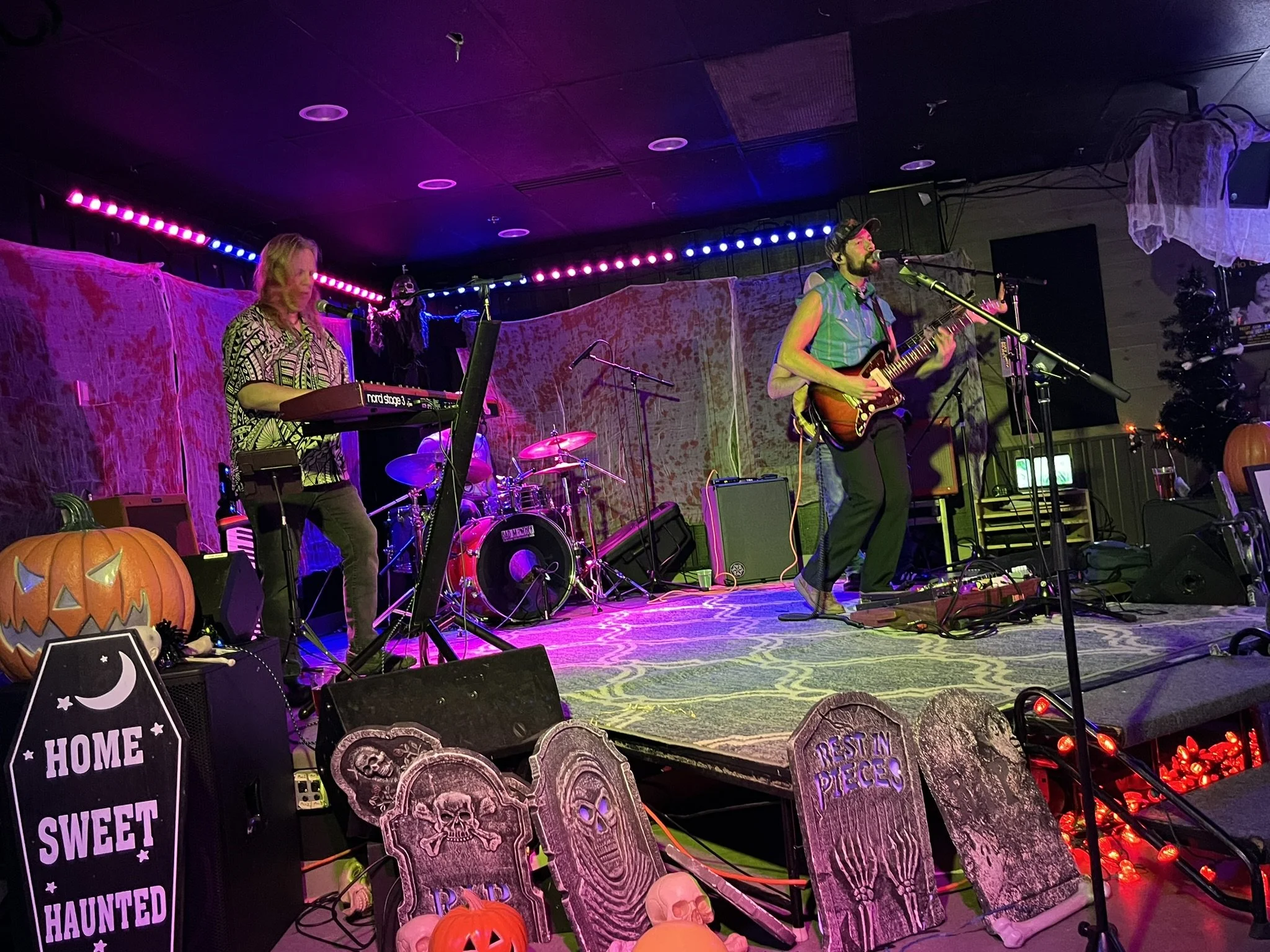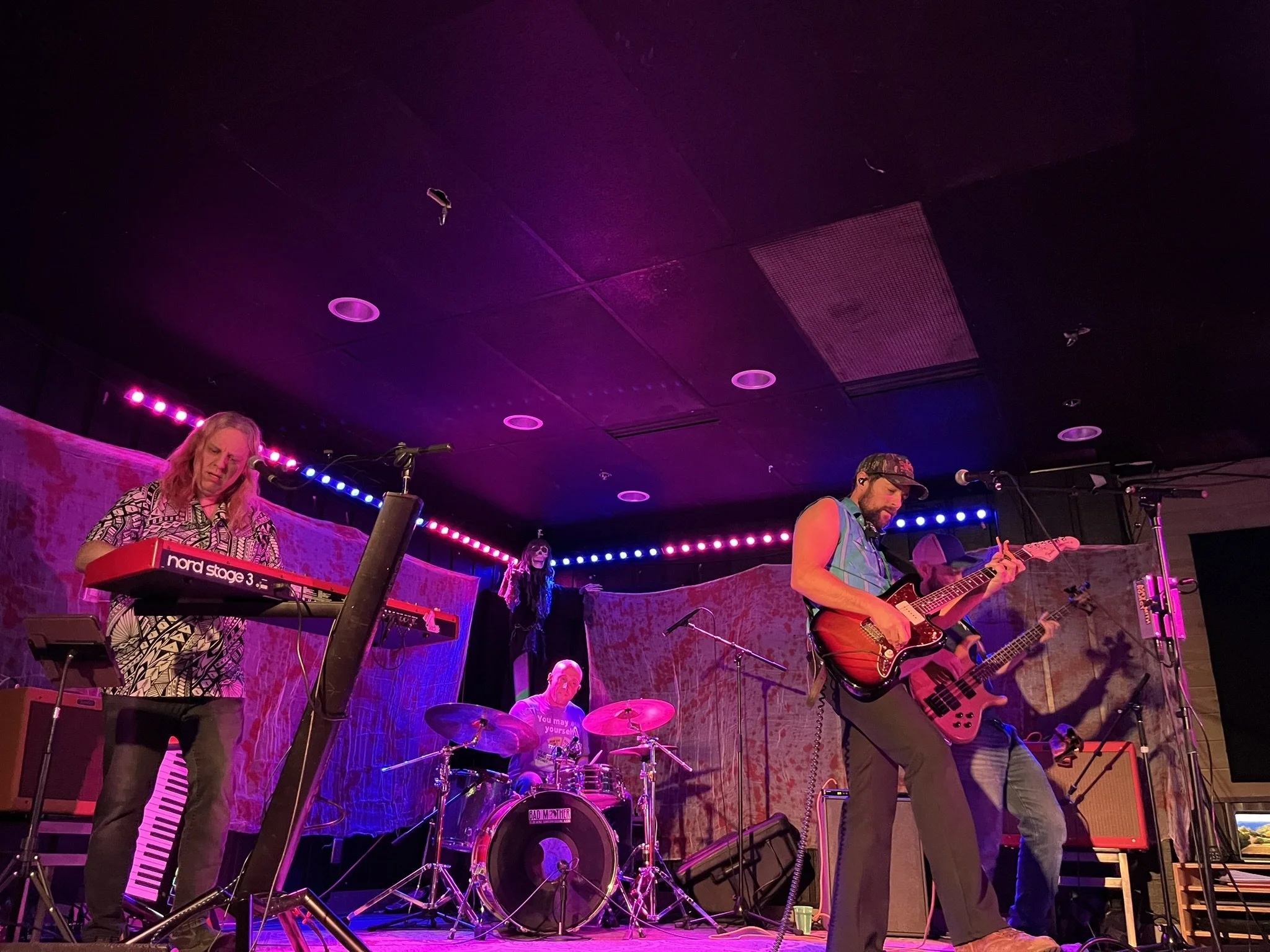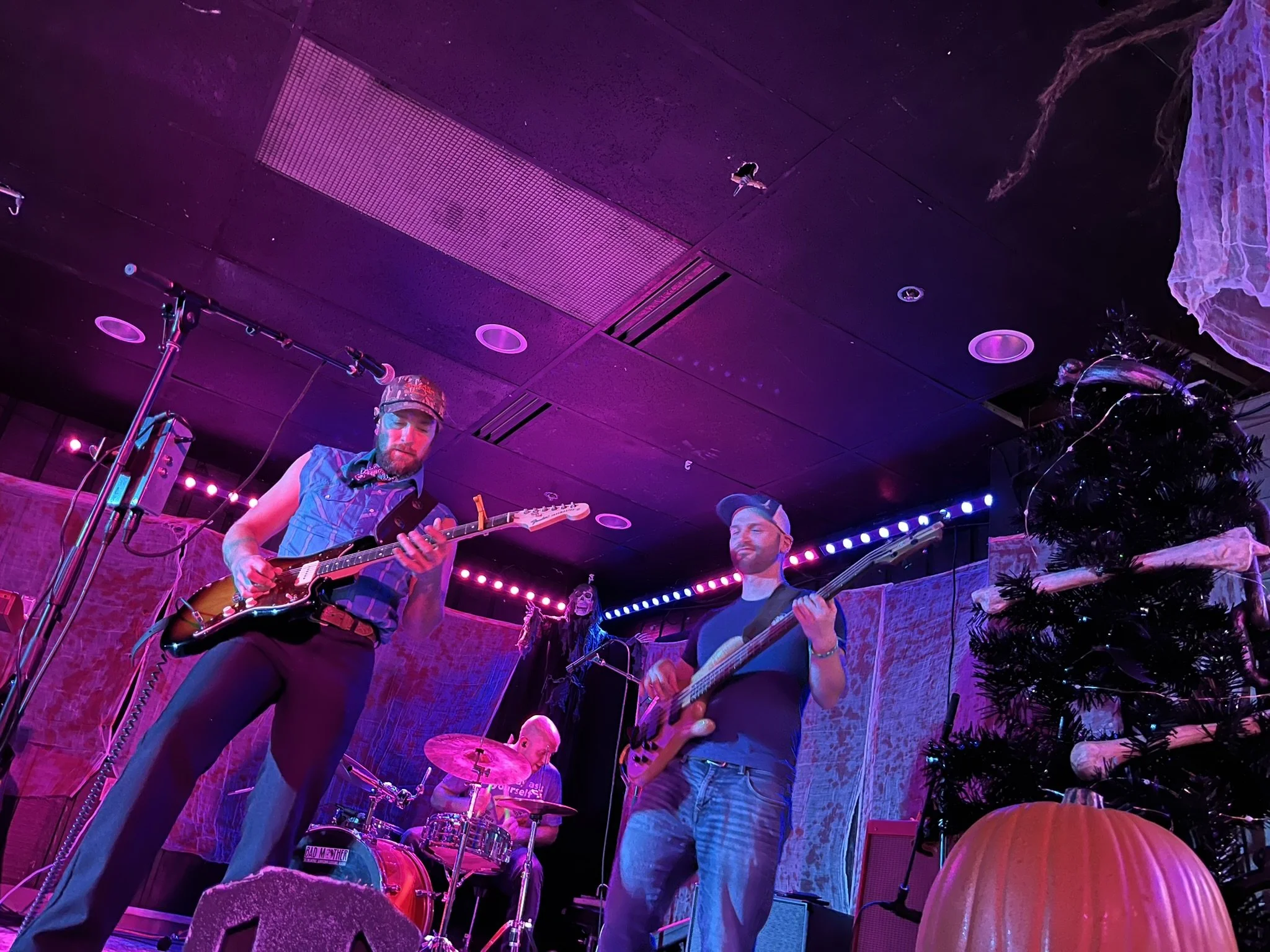“Just Like You Wanted It”: Casey Smith Project Talks About New Album and Touring Iceland (Part 1)
By Manuel A. Melendez
This interview has been edited for length and clarity. All photos provided by Manuel A. Melendez.
Manny: Casey. (laughs)
Casey: (laughs) That’s my name!
Manny: Let’s get right to it. Let’s talk about the tour first. You’re going to Iceland. Tell me how that started and
how long you’re going to be there, what the festival is, and what you hope to get.
Casey: Well, they put it on Iceland Airwaves, which is the festival's name, and you can go to their website and submit your application to go to Iceland. For me, that started with talking to other Alaskan bands, and they talked about going to Iceland. So, I submitted us as a joint effort and we were accepted. There’s a guy from Juneau, Jazz Air, a rapper, and then there’s the band SunDog, who I’ve facilitated to come to Fairbanks. We’re just a group of Alaskans going over there together and putting on a showcase of Alaskan artists.
Manny: Fantastic. That’s on a Saturday. The 9th?
Casey: Saturday the 9th. We’re going to take a week to go there. It’s also a convention, so there will also be speakers and other events.
Manny: Is this in Reykjavík?
Casey: Yup, Reykjavík, the capital. I'm a huge fan of KEXP out of Seattle, and they joined with Iceland Airwaves whenever that festival was in the fall, so that's the first time I heard of it. And, obviously, I know about New York and all that– those artists–
Manny: Who's New York? I don't know anything about her.
(Casey and Manny laugh)
Casey: So I picked up on a few random Icelandic artists as I didn't know that many, and I've been a big follower of KEXP and trust in their influence and everything. So, getting to go and represent Alaska with other Alaskan artists worked out this year because, economically, we had to front some of the money to go and everything. They're not paying us necessarily to go. If you can fly over there, then you can go.
Manny: So do they cover, like, hotels, or–
Casey: We're getting grants to do that.
Manny: Okay, good, good, good!
Casey: We're kind of doing it DIY style.
Manny: But it is an offering– where you apply, and then you get to go, but it's not a comprehensive package–
Casey: No, not at our level, as far as artists go. I mean, I think maybe if you had a team of people and you could negotiate–
Manny: Like a rider, yeah?
Casey: But just for us, getting to go is awesome, and out of Alaska. The long-term goal for the people I'm working with is a joint venture. Hopefully, we can facilitate Icelandic artists coming over as well.
Manny: Ah, this leads to my next question, as usual! (laughs) If going to Iceland is an opening for you, then, to me, it seems that naturally, you would then become the gateway for Icelandic artists on your level and for you to go, “Hey, Fairbanks would love to hear you, or Alaska would love to hear you.”
Casey: What I'm learning with music is that a lot of artists are smaller than you think, even though they present themselves as big on the web because they have good content and they're well established, and they just maybe have more resources, and they've been doing it longer, and maybe rename themselves a few times or whatever. So, people want to make it as cheap as possible and connect with people who can help them. And a lot of artists and the lifestyle of artists is just a cheaper life, like, they're sleeping on couches and doing it modestly. So I'm all about helping in that. At this point in my life, too, I'm not looking to lose a bunch of money doing it either– just trying to have fun while I'm doing it and make it, you know, interesting and new. And it's been cool to hopefully find people that want to do the same thing and have the same goals. And that's been the tricky part, yeah, just each phase of my life, people kind of phase out and stuff, you know, you're like, “Okay, we'll be doing five years together, three years, and you find new people that want to go and travel and do shows, a bigger show with you.”
Manny: Well, speaking of bigger shows, do you think that this might, for you, kind of open up the possibility of Casey Smith Project being now– you're more actively going to be looking for outside-of-Alaska events or venues or festivals? You've been Casey Smith Project for a while. I know you've always talked about how you understand the limitations, how you do things, how the world works, and all that. But now that you're going to Iceland, maybe you've thought, “Okay, well, if it's Iceland now, then maybe we can do somewhere else that's just not Alaska.” I wonder if you thought about that.
Casey: I've been thinking about it for a long time. It's just about making it realistic. How to get it done. I think pipe dreaming is one thing. And, like, having big goals– whenever you talk to people, they’re like, “Oh, set a five-year goal.” Like, what is it? What would you want to do in five years even if you can't achieve them? Where would you want to be in five years? And musically, there's been the same goals for a while, and I saw I'm not there, but that said, I think I've been achieving things slowly, which has been nice because it's not terrifying, you know, it's like, been gradual, and like people that stick by you or, you know, and
Manny: That's important to you; it's a gradual, steady process.
(Casey and Manny laugh.)
Casey: Personally, I don't think I'm, I'm going at a rate that I would, you know, like if I was a music major, and that was, like, my, that was my focus. I was like, Hey, I'm going to use my degree, but I am not. I'm an engineer with a day job, a life, and a family. And so, for me, focusing on music is not secondary but compartmentalized. So, my goals are that this wasn't necessarily something I had been pipe dreaming about, like, “Oh, I'm going to Iceland to play to Iceland Airwaves.” But I've been thinking about KEXP for ten years, thinking, how do I get on that show? And, like, what do I have to do to get there? And I think, oh well, I may have to live in Seattle. Or what do I have to do? What avenue do I have to go on to get there? And yeah, it's like, oh, well, this is kind of a bridge, in a way, because they are connected. And, like, I'm doing that. So it's like, I think it's all part of the portfolio, that you're pursuing and traveling and showing that you're, you know, taking on opportunities when they come one that's happening. So you have to set aside everything you think is necessary and make that a priority. It's tough because everybody's busy, you're busy, I'm busy, but you can make time for everything. You can do it and make it look attractive, fun, relaxed, and you planned it, right?
Manny: Well, I know part of your plan is your new album.
Casey: I've been planning that for a while. Yeah, it's a lot of work.
Manny: So, let's talk about the new album a little bit. I know you're still in the process of mastering it. You hope to have it mastered soon. But when did this process start in earnest for you? This new album? Talk a little bit about its genesis.
Casey: Well, I think I'm always writing. That part isn't new, but I think, in the beginning, the first track I recorded, a single, is already out called “What Do You Say?” I recorded that in June of 2023, so that was the beginning. And the way I write as a solo artist is that I just kind of, like– I'll book a session, and then I'll go to the studio. And then I record a song, kind of like, song by song, rather than like, “Oh, I'm going to write that album.” Because I think that's a little daunting to think about. So I started that journey on June 23, and then I just kind of like, was going to, sort of get at the feel for the people I was working with, the producers or engineers. The guy I work with a lot is Chad Reynvaan, a singer-songwriter and multi-instrumentalist who plays the drums for the Jangle Bees and has a bunch of albums out. And just the coolest guy to work with. He's super talented, and get in a room with him, and he knows his gear, so it's cool to get in there. And he has an analog vibe, which I feel like when you do recordings digitally, you're hearing your imperfections. But, like, with analog, I feel like there's, like, there's this noise that goes with it that kind of makes your music have like
Manny: Kind of LoFi.
Casey: And I’m really into Lo-Fi music, so whatever that says about me.
(Casey and Manny laugh.)
Casey: So yeah. So I started working with him, but life is busy. My drummer, Derek Haukaas, also works for a studio called Frostline, which is very prestigious and has expensive gear. It's like, you know, more than a grand to rent their space for a date. And I'm working with him, and he's given me a reasonable rate and everything. So I'm doing both studios, and I'm just picking out these songs. I write a song, schedule a date, and then get in there and record them. So it's just natural, just happening. I'm just making these songs happen individually, and the next thing I know, a year and a half has gone by. Eleven songs this time around. I think the difference is that I just wanted to, like, now that I'm further along as a musician, I have more respect and have more friends and resources, just bringing in more people to collaborate and get their input. They're giving me little bits, and I feel very privileged to have what I think are more talented people participating and giving me love and acknowledgment, which means a lot to me because I feel I’m struggling at times. You know, like “Keep on keeping on” is hard. So just, just when you get a little bit from someone, it means a lot– “Oh, hey, I'll come to your session for four hours, and I'll give you a little bitty backing vocals,” or whatever, means a lot. What's been the most rewarding this past year, a year and a half, is having what I consider mentors participate and share my music. It's been awesome.
Manny: Has this been the quickest turnaround for a Casey Smith Project album?
Casey: Yeah, yeah. As soon as I ended the last album, Red Lights and Whiskey, I recorded it all with Chad Reynvaan. In this one, I had three different producers/engineers. So I worked with Chad again, Derek Haukaas, and this new guy who was in Medium Build. His name is James Glades, and he's super talented. I got to work with him for the first time. When I was like, it's just like, these mini crushes you get ah, you think I'm cool enough to, like, work with you, and I get to go to your lab, and it's, like, building relationships, you know what I mean, and like, sitting down for however brief time. Yeah, you're paying them, in a way, but it's more than that because they don't have to work with you.
Manny: Is this the first album you've primarily worked on with Frostline Studios?
Casey: I think I wanted to at the beginning. I was like, I'm going to work with Derek at Frostline this album because I promised them. In a way, it was like the last album was more with Chad and at Wattage Studios. The beginning of this album was five songs we demoed in my buddy Scott's basement, and it was with Derek. And we were like, “Okay, these are the kinds of songs we will write.” We want to go, and I want to work with you in Frostline, but I have a budget, yeah, so, so I'm going to record a lot of it, and you're going to, we're going to do what we need to in Frostline. But, you know, I don’t want to break the bank on it. I don't have twenty grand to blow. It’s like one or two grand per session. And he's busy, Derek, he's super busy. They film, you know? Netflix stuff, and like, they're recording not just music, but for TV shows and the like, which you have to do. You can't just be a one-trick pony these days anymore. So he's recording audio for some series or whatever, and then he comes back, and we have a session, and he's like, a really good drummer and a good producer, and it was him. So Derek and Scott, my bass player. We were like, we're a group as much as we can be, and we wrote some songs together as much as we could be, as well as a group. Otherwise, I wrote them myself. If I couldn't get them as a group to help me, I would just write alone, which is my default, not my preference, but yeah–
Manny: If it happens, it happens.
Casey: It's what it is, right? You gotta know who's going to be in the Casey Smith Project.
Manny: We talked about that last time you read. I like the idea that you are Casey Smith, and this is Casey Smith Project. People may come and go, but a kind of group exists.
Casey: I want it to be and always, yeah, make something happen. You can't say, “You're going to be in my band.”
(Casey and Manny laugh.)
Casey: I don't think I'm there.
End of Part 1. Check our website for PART 2 on Friday, November 1.




